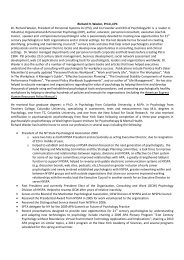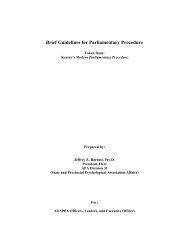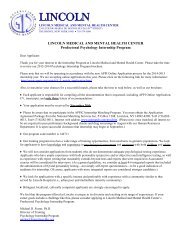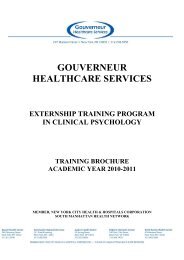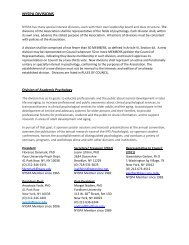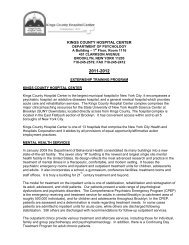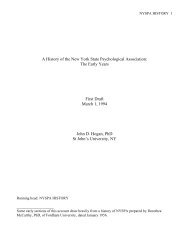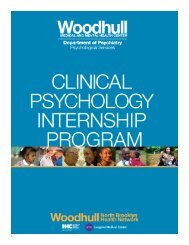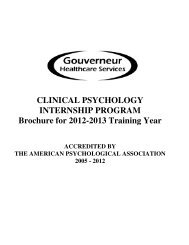2011 ⢠NYS Psychologist - New York State Psychological Association
2011 ⢠NYS Psychologist - New York State Psychological Association
2011 ⢠NYS Psychologist - New York State Psychological Association
You also want an ePaper? Increase the reach of your titles
YUMPU automatically turns print PDFs into web optimized ePapers that Google loves.
Yoga Therapy: Road to Resiliency<br />
Helping Women, Men, and Children Heal in the<br />
Wake of Terrorist Attacks—Revisited<br />
Mercedes A. McCormick, PhD, RYT and Oksana Ostrovskaya, MA<br />
Pace University, <strong>New</strong> <strong>York</strong> City, <strong>New</strong> <strong>York</strong><br />
Today psychologists are being encouraged to practice clinically<br />
using an integrative health model. An integrative health model<br />
incorporates traditional and alternative health tools and techniques<br />
to reduce psychological discomfort. This is the tenth year<br />
anniversary of the most horrific terrorist attack in our nation's history-<br />
9/11 -The World Trade Center Attack. The purpose of this<br />
article is to fold: first, to revisit interventions used to help 9-11 victims<br />
heal shortly after the 9/11 attack; and second, to discuss and<br />
demonstrate the integrative alternative technique- Yoga Therapy.<br />
A decade ago Yoga Therapy was implemented as an effective<br />
stress-reducing tool to help people heal and recover from the 9/11<br />
traumatic event. Post-traumatic symptoms in adults and children<br />
are described. Consultative, experiential, and practical use of Yoga<br />
therapy techniques for traumatized women, men and children<br />
are given. Participants were mental health practitioners, educators,<br />
mothers, fathers, and children in the <strong>New</strong> <strong>York</strong>–<strong>New</strong> Jersey<br />
Metro Area who were affected by the 9/11 attacks. Yoga therapy<br />
techniques were reported by participants to help to reduce anxiety<br />
and depressive symptoms and to increase positive thoughts and<br />
behaviors in a safe, supportive environment. Thus Yoga therapy is<br />
experienced as an effective stress-reducing vehicle that provides<br />
time and structure for individuals to improve psychological integration<br />
and adaptation.<br />
Keywords: Post-traumatic symptoms, Yoga therapy, Stress reduction<br />
The horrific events of the terrorist attacks of 9/11 awakened<br />
the entire country to the uncertainty and fragility of human life and<br />
the tentative safety of our existence. In the aftermath of this calamity,<br />
many people are experiencing frustration in their healing<br />
process.<br />
The yogic perspective recognizes that each individual’s response<br />
to traumatic stress is unique. On the Yoga path individuals<br />
become aware of normal responses to abnormal events, and Yoga<br />
is the vehicle that brings awareness of disharmony between<br />
body and mind. Individuals recognize negative thoughts, feelings,<br />
and behaviors that are detours on the road to wholeness. They<br />
become resilient in dealing with stress and restore balance between<br />
body and mind as they move toward the destination of experiencing<br />
their true nature (Epstein, 1998).<br />
Meditation, Breathwork, and Movement are the fuels to bring<br />
relief from intense body sensations and strong emotional feelings.<br />
Meditation helps to clear the mind of distractions and to bring a<br />
person into the present moment. Breathwork enables the individual<br />
to become open and recognize body sensations. Movement<br />
through âsanas (yoga postures) releases emotional tension in the<br />
body and mind; this process supports the individual in becoming<br />
flexible in handling trauma. This threefold practice of Yoga thus<br />
transports practitioners into the direct experience of personal<br />
wholeness.<br />
A decade ago I provided information, structure, and support<br />
to help people become more aware and resilient in dealing with<br />
their unique responses to terrorism and trauma. Within this context<br />
I will describe my consultative, experiential, and practical efforts<br />
as a psychologist in implementing Yoga therapy techniques<br />
for mental health practitioners, women, men, children, and families.<br />
An adult's reaction to traumatic events is different than a<br />
child’s. An adult’s reaction is based on his or her physical and<br />
mental health and how he or she has negotiated other losses and<br />
traumas in life. When an adult witnesses an event such as 9/11<br />
the immediate normal protective reactions are shock and denial.<br />
Other reactions may include extreme behaviors, feelings of anxiety,<br />
nightmares, and flashbacks immediately following the event.<br />
As the initial shock subsides, reactions vary from one person to<br />
another (Van der Kolk, McFarlene, & Weisaeth, 1996).<br />
The symptoms of Post-Traumatic Stress Disorder may be<br />
displayed over time. According to the Diagnostic and Statistical<br />
Manual of Mental Disorders, Fourth Edition, (1994) an adult’s reactions<br />
are divided into three categories: re-experiencing (via intrusive<br />
thoughts or nightmares of the event), avoidance (through<br />
efforts to avoid thoughts, feelings, activities, people, or places<br />
reminiscent of the event), and increased arousal (characterized by<br />
difficulty sleeping, irritability, exaggerated feelings of not being<br />
safe, or being startled) (Diagnostic and Statistical Manual of Mental<br />
Disorders, 1994).<br />
A youth’s physical and emotional responses to trauma interact<br />
with variables such as age, life experiences, temperament,<br />
family, and other individuals. Being younger, being female, having<br />
a family member exposed to the World Trade Center attack, having<br />
personal physical exposure to 9/11, and having prior exposure<br />
to trauma were factors found to increase negative reactions to<br />
trauma (<strong>New</strong> <strong>York</strong> <strong>State</strong> Psychiatric Institute, 2002).<br />
Young people who undergo traumatic events often experience<br />
fears, sleep problems including nightmares, increased physical<br />
complaints or illness, avoidance, anger, increased aggression,<br />
shame, anxious attachment, problems in attention and concen —<br />
————————————————————————————-<br />
Mercedes A. McCormick, PhD, is a licensed psychologist in <strong>New</strong> <strong>York</strong><br />
<strong>State</strong>. She received her doctorate degree in Family and Marriage Therapy<br />
from Seton Hall University in NJ and MS in School Psychology at Pace<br />
University, NYC. She is certified as a school psychologist in the states of<br />
<strong>New</strong> <strong>York</strong> and <strong>New</strong> Jersey. She work as a school psychologist for twentyeight<br />
years in an urban school district in NJ. She is trained in yoga therapy<br />
and mindfulness mediation. In addition, she is the MA Coordinator of the<br />
MA program in Psychology at Pace University and teaches in the Pace<br />
Department Psychology Department. Mercedes is the Chapter Adviser for<br />
Psi Chi. She is a recent Past-Chair of the Psychology Section of the <strong>New</strong><br />
<strong>York</strong> Academy of Sciences as well as serving as President of <strong>NYS</strong>PA<br />
Division of Women's Issues (2012). She is currently the VP of Eastern<br />
Region of Psi Chi, International Honor Society of Psychology and is the<br />
President -elect of APA Div. 52 International Psychology. She has received<br />
distinguished awards and recently APA Division 1 status as a Fellow.<br />
She has written about alternative techniques in helping others heal<br />
after traumatic events and creativity. She is a mentor that continues to<br />
strive to teach and mentor others to learn and solve life challenges presented<br />
to them. She currently writes about time management, mentoring<br />
and shared leadership for students.<br />
Page 1<br />
Vol. XXIII No. 2 • Fall <strong>2011</strong> • <strong>NYS</strong> <strong>Psychologist</strong>



